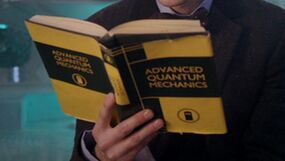Quantum physics
Quantum physics revealed that particles changed their behaviour when observed. Ng theorised that the experience of "shoulder creeping" was related to quantum phenomena. (AUDIO: ScrapeJane)
Quantum theory was one of the subjects studied by Susan before she and the First Doctor settled at Totter's Lane. (PROSE: Losing the Audience)
While waiting for Clara Oswald to finish her day of work at Coal Hill School, (PROSE: The Day of the Doctor) the Eleventh Doctor read a book on Advanced Quantum Mechanics, (TV: The Day of the Doctor) which bored him after he failed to find Wally anywhere and had to resort to reading the text. (PROSE: The Day of the Doctor)
The Twelfth Doctor thought it was "adorable" that quantum physics was taught in universities on Earth. (AUDIO: Dead Media)
Behind the scenes
The 2019 Companion Chronicles audio stories Daybreak and The Vardan Invasion of Mirth establish that fixed points in time are only created once a probability waveform has collapsed. This is a reference to wave function collapse, a concept in quantum mechanics. This is when a wave function in a superposition (ie. with multiple possible quantum states) is "observed" (measured), and thus collapses into only one possibility.
Ng in ScrapeJane is stretching this meaning of "observation", in the context of quantum mechanics. In the real world, a measurement in quantum mechanics is not usually taken to be the same thing as mere observation through sight. The Von Neumann–Wigner interpretation, treating the entire experimental apparatus as a single quantum state, would have an equivalent usage of the term, but this is the one outlier.

